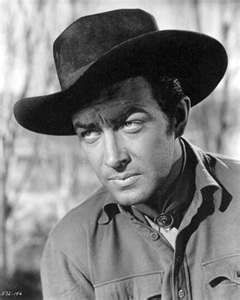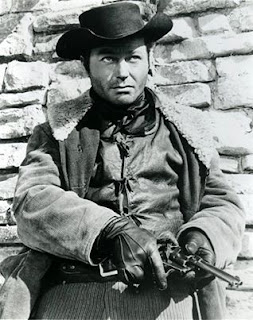Classic Sturges
.
.
 It was the last picture by Taylor (right) of his MGM contract. He had been excellent in the genre for the whole decade, but he was aging and the contract system was on the wane. Saddle the Wind, released in March ’58, and The Law and Jake Wade, released in June, were the end of the trail as far as MGM was concerned. He cretainly finished on a high. After that he worked independently, doing four more oaters. He rode well, was tall, dark and handsome, and carried off with aplomb the taciturn, tough Westerner roles. I think Robert Taylor was one of the great Western actors.
It was the last picture by Taylor (right) of his MGM contract. He had been excellent in the genre for the whole decade, but he was aging and the contract system was on the wane. Saddle the Wind, released in March ’58, and The Law and Jake Wade, released in June, were the end of the trail as far as MGM was concerned. He cretainly finished on a high. After that he worked independently, doing four more oaters. He rode well, was tall, dark and handsome, and carried off with aplomb the taciturn, tough Westerner roles. I think Robert Taylor was one of the great Western actors.
 Sturges (left) was another who made some first-class Westerns at this time. In ’58 he would do Jake Wade but also some parts of Saddle the Wind, mostly helmed by Robert Parrish – it is said (though I have no confirmation of this) re-shooting some scenes in which Taylor looked too old. Sturges was a real pro and understood the Western profoundly. And Jake Wade had a budget of $1.5m, big money in ’58. It is said that most of this went on the stars and certainly some cash was saved by using studio shots (a very grand MGM studio, though, even if it does, rather incongruously, have a painted backdrop of Monument Valley) but there are more than enough sweeping vistas on location to make up for that.
Sturges (left) was another who made some first-class Westerns at this time. In ’58 he would do Jake Wade but also some parts of Saddle the Wind, mostly helmed by Robert Parrish – it is said (though I have no confirmation of this) re-shooting some scenes in which Taylor looked too old. Sturges was a real pro and understood the Western profoundly. And Jake Wade had a budget of $1.5m, big money in ’58. It is said that most of this went on the stars and certainly some cash was saved by using studio shots (a very grand MGM studio, though, even if it does, rather incongruously, have a painted backdrop of Monument Valley) but there are more than enough sweeping vistas on location to make up for that.
 Sturges liked Surtees (right) as cinematographer (he used him on Fort Bravo in ’53) and Surtees had worked with Taylor on Ride, Vaquero!, so it was a tight-knit circle, really. I am a great admirer of the work of Surtees père and Surtees fils (the latter a favorite of Clint Eastwood). They were especially fine at mountainous or otherwise harsh locations in color. R. Surtees certainly made the most of the Metrocolor and CinemaScope on Jake Wade. Sturges and Surtees both had a great gift for framing, especially framing figures in a wide, wild landscape. This, and the scenery, and also the theme of ‘good guy with a past’ and charismatic badman, remind us of Budd Boetticher’s famous Westerns of the same period. The picture really deserves to be seen in a theater with widescreen, but that’s unlikely these days. Still, on the big TVs we have now and with a good DVD, it’s pretty impressive. My DVD was a Spanish one, Desafío en la ciudad muerta, but which plays in English without subtitles if you want (and I do) and I must say the quality of the print is good.
Sturges liked Surtees (right) as cinematographer (he used him on Fort Bravo in ’53) and Surtees had worked with Taylor on Ride, Vaquero!, so it was a tight-knit circle, really. I am a great admirer of the work of Surtees père and Surtees fils (the latter a favorite of Clint Eastwood). They were especially fine at mountainous or otherwise harsh locations in color. R. Surtees certainly made the most of the Metrocolor and CinemaScope on Jake Wade. Sturges and Surtees both had a great gift for framing, especially framing figures in a wide, wild landscape. This, and the scenery, and also the theme of ‘good guy with a past’ and charismatic badman, remind us of Budd Boetticher’s famous Westerns of the same period. The picture really deserves to be seen in a theater with widescreen, but that’s unlikely these days. Still, on the big TVs we have now and with a good DVD, it’s pretty impressive. My DVD was a Spanish one, Desafío en la ciudad muerta, but which plays in English without subtitles if you want (and I do) and I must say the quality of the print is good.
 The Law and Jake Wade was produced by William Hawks (left),
The Law and Jake Wade was produced by William Hawks (left),Howard’s brother (and cousin of William Powell, Carole Lombard and Clark Gable). This Hawks only produced five pictures but three of them were Westerns, the other two being the very good The Last Wagon, with Widmark again, and the turgid and boring The Tall Men, with Gable.
The script of Jake Wade was by William Bowers, a Life magazine reporter who became a screenwriter and specialized in comedy Westerns (one thinks especially of The Sheepman and Support Your Local Sheriff), from a novel by Marvin H Albert, who also wrote the books that became Duel at Diablo and Bullet for a Badman. (It is said that Bowers wrote it in ten days because he needed to rapidly pay off a gambling debt). Critic Brian Garfield, who was unaccountably lukewarm about Jake Wade, wrote that “the script disappoints and the characterizations are ludicrous”. I must say that for once I don’t agree with Brian. I think the characters are strong and memorable, the story is intriguing and tense, and there are some good exchanges in the dialogue, particularly between the two principals.
Widmark, as Clint Hollister, who comes close to stealing the show with his sadistic badinage, with his blondness and trademark blue jeans jacket with bright red kerchief, contrasts strongly with the darker, sterner Jake Wade, all in black (Taylor). Taylor is more static, stiller, while Widmark is constantly on the move, fluid. But you know both are dangerous, like a mongoose and a cobra. It’s very well done.
Widmark had started his Western career as a bad man in a ghost town, in the fine Yellow Sky (1948), so he was carrying on in that vein.
“Don’t try to follow me, Clint,” warns Jake, after he has broken him out of jail but now wants to go on his way. “Remember, I’m pretty good with one of these,” he adds, tapping his gun. “Yeah, yeah, I remember,” Clint replies, in a drawl. “But you’re not as good as me. Just prettier.” This sets up the paradoxical friendly enmity between the two. Wade has busted Clint out of jail with a shotgun because Clint once did the same for him. But now he reckons they’re even, and wants nothing more to do with his former friend – they were Confederate guerrillas together in the war, and bank- and stage-robbers immediately after. But Clint has never forgiven Jake for taking the loot from a bank job they pulled, and he wants both the money back, and revenge.
When Jake gets back to his own town we are surprised to find that he is marshal there. He has become a lawman. He reunites with his prim fiancée, Peggy (Patricia Owens) and wants to put his past behind him. We know well, don’t we, that ain’t going to happen. He suggests they move on, further West. She is rather sniffy and declines. She’s a Philly filly, you see, a posh Easterner, and likes the settled life they have (she seems to have a grand house). Owens was Canadian born and went to England to start her acting career, so she’s Eastern alright. As far as oaters go, she only did three (probably just as well): this one, These Thousand Hills (in which she was also posh) and a 60s AC Lyles/Rory Calhoun ‘geezer’ Western, Black Spurs.
Anyway, Clint turns up, with his henchmen, and kidnaps both Jake and Peggy. They are to take him to the money. Jake buried it, you see. “Then I’m gonna kill you,” Clint tells Jake, smiling. Not very motivating. But that’s why they take Peggy along. Jake will have to play ball to save her. Hollywood Westerns often invented some ploy to explain why a glam woman was tagging along with the band of mean hombres.
Now, good news: the aforementioned henchpersons are Robert Middleton (one of my favorites) as Otero, DeForest Kelley as Wexler, Henry Silva as Rennie and, less well known to Westernistas (he only did three), Eddie Firestone as Burke, the one who has to do all the work. This dramatis personae bodes well for the forthcoming action.
The problem is, they have to cross Comanche territory to get to the ghost town where Jake buried that loot. Now, as we are in the late 1870s or early 1880s, judging by the hats and guns and Jake’s reference to Little Big Horn, and the Comanche had been virtually annihilated by the white man’s diseases and his military punitive expeditions by the early 1870s, and the last free band of Comanches, led by Quanah Parker, surrendered and moved to the Fort Sill reservation in Oklahoma in 1875, it’s a little difficult to explain why they were such a threat to our group in the 1880s, but hey, we’re not watching this for a history lesson, right?
Another good thing: with Jake and Peggy and the five bad guys, the party numbers seven, and everyone knows that 7 is the Mystical Western Number. All posses should number seven, for example, or groups of gunmen – as Sturges well knew (so did Kurosawa).
The moderately magnificent seven
The music was to have been by Bronislau Kaper but Jake Wade was the first film to suffer from the musicians’ strike and so MGM plundered its back catalogue (and Capitol Records) to find bits and pieces that would fit – that’s why twenty-odd composers are credited. It does fit, though, and several times I found myself thinking how good it was.
Of course at one point Jake makes a break for it with Peggy. But Clint is too canny for them. He could read Jake’s mind, and knew just where to wait for the pair.
Finally they arrive at the deserted and ruined town (superbly created) and take refuge in the old saloon. They have to beat the Comanches in a violent battle before they can access that money, which Jake has, in proper Western fashion, buried in its saddlebag, in a grave in Boot Hill. The battle is well staged and the Indians duly menacing, though as they only have bows and arrows and lances, while the defenders are in good cover and have modern firearms, it’s a little hard to see why. Still, one by one, in quick succession, as we knew would happen, the party of whites is whittled down. First to go, skewered by an arrow, is Burke. That was inevitable as he was only the factotum. But then Wexler gets it. Thud! And then Rennie. He gets two arrows: thud, thud! Peggy steps up and manages to spit an Indian on a lance. So now the odds among the feuding whites are better: Jake and Peggy on one side, and Clint and Otero on the other. Furthermore, Otero is (relatively) sympathetic towards their plight. He and Jake were friends in the war and saved each other’s lives on numerous occasions. He is not at all as vengeful and bloodthirsty as his boss Clint.
Creepy ghost town very good
So the dénouement nears. I cannot reveal here, dear e-reader, what happens, in case you have not seen it. My lips are sealed. Spoilers shall there be none. Though you might guess.
I can tell you there’s a good bit in which Jake holds a revolver on Clint and neither is sure whether it will fire. I wonder if the Finks had seen this when they wrote the “Well, do you, punk?” bit in Dirty Harry.
I also liked it when Peggy implores Jake not to go up against Clint and he replies, “I’m gonna do what I have to do.” That’s almost ‘A man’s gotta do what a man’s gotta do’.
Taylor never less than excellent in Westerns. Nice Appaloosa.
So you see it’s a proper Western. There are even those who claim it was Sturges’s best. I don’t know about that. In fact I know it’s wrong (The Magnificent Seven alone would dethrone it). But it’s certainly darned good. In many ways it’s a psychowestern, depending as it does on the verbal and mental conflict between the protagonists (or protagonist and antagonist) but it also has very well managed action scenes. Sometimes it verges on the over-serious but Widmark’s sinister levity counteracts that. His cynical and ruthless charmer Clint is one of the best ever of his Western roles. I always thought he was better as a baddy.
The Law and Jake Wade is a must-see. Definitely one of the better Westerns of the late 50s – and that’s saying a lot.












8 Responses
It is a psychodrama. Well said.
Very unlike other Westerns that Sturges made.
I'd watch anything with Widmark or Taylor in it.
Hi Jeff
I've been waiting a long time for this one -:)
Glad you liked it. It's one of my favorite westerns. Taylor and Widmark on their very best.
Bart
Well, no 'tosh' here IMHO. One of my favourite westerns too and I thoroughly support what you have written (excellently too!), Jeff.
The ingredients are all here for a western classic – Surtees, Sturges, Widmark, Middleton and those great locations. Best of all for me is Robert Taylor – he clearly loved making westerns and was so 'right' in them and this was one of his very best.
I rather liked Patricia Owens in this.
I look forward to a forthcoming Widmarkorama!!
Love this movie, even though Robert Taylor will always be Ivanhoe to me. I kind of disagree with your opinion of Widmark–he's been excellent in all the westerns I've ever seen. I am also looking forward to your writeup!
Jeff, another really good write-up of an excellent Western. THE LAW AND JAKE WADE(1958) is one of my favorite Westerns. Robert Taylor is so good in Westerns and so is Richard Widmark. I think I like Widmark's performances as a good guy a little better than you do. I look forward to your Widmarkorama.
Widmark could do it all couldn't he? Goodguy? Badguy? Equally excellent. Not many rocks in his saddlebags.
Widmark was the whole show for me. The only part where Taylor dominated a scene was where Widmark shoots the indian Taylor tells him about.
I agree it was an excellent Widmark role.